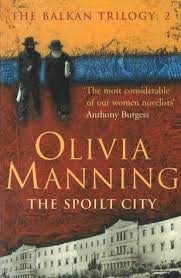The Spoilt City by Olivia Manning (Book Review)

The Spoilt City is the second book in the Balkan Trilogy and continues the story of Guy and Harriet Pringle; a recently married couple living a precarious existence in supposedly neutral Romania in 1940. The interpersonal drama that began in the first novel grows more taut as Guy and Harriet struggle for both existence and meaning in an increasingly hostile country. Though the novel is written in the third-person and with an air of detachment, the reader is often privy to Harriet’s thoughts – especially those pertaining to her increasingly strained relationship with Guy.
Now she was coming to know Guy, she was beginning to judge him. When they had married ten months before, she had accepted him, uncritically, as a composite of virtues. She did not demur when Clarence described him as “a saint”. She still might not demur, but she knew now that one aspect of his saintliness was composed of human weaknesses… Reflecting on the process of involvement and disenchantment which was marriage, she thought that one entered it unsuspecting and, unsuspecting, found one was trapped in it.
Harriet comes to realize that Guy’s inability to discriminate with his generosity is a mechanism to prevent any one person from gaining an onerous emotional demand from him. Guy, more than anything, fears what codependency will mean for his freedom and his ability to participate in world events. Like his politics, Guy’s personal behaviour is utilitarian. He exudes love to others with the same intensity he does towards his close friends and family. Though ethically consistent, Guy at times seems very inhuman.
She envisaged a creature similar, but dependent; someone she could compass; her own possession; a child, she supposed. That might be permitted one day, but Guy insisted that at the moment their circumstances were too insecure for children. Was that a reason or an excuse? After all, children were possessions. They, too, defined and limited their possessors.
A sense of distance between the couple is reinforced by a lack of discussed intimacy. One is bound to wonder whether the couple has sex at all or whether there might be an element of impotency. Given Harriet’s young age (22) at marriage, it is possible she is unaware of what sexual dysfunction is or what the usual patterns of intimacy are in a relationship. Manning often writes in sparse prose that encourages the reader to draw their own inferences. Consider a scene where Harriet “baptises” Guy after they have a disagreement over religion.
[W]hen Yakimov had gone off to have a bath, she lifted the teapot and poured cold tea over Guy’s head. While he sat stolidly accepting of her follies, she said: “I baptise thee, Guy, in the name of the Father and of the Son and of the Holy Ghost,” which was all she knew of the baptismal service.
We are not told of how Guy’s clothes got wet, what his facial expression was, or if they laughed about it afterwards. Despite the scarce details of many scenes, the book will sometimes indulge the reader with a strong impression of Bucharest.
The end of June brought a dry and dusty heat to Bucharest… Each day began with a fierce, white light splintering in between the blinds and shutters. By noonday, the ingot of the sun dissolved in the sky as in a vat of molten silver… When the offices closed for the midday meal, the tramway cars were hung with clerks fighting their way homes to darkened bedrooms. At five, when the atmosphere was like felt, the offices reopened, but the rich and the workless remained inactive until evening.
Written less than two decades after the war ended, Manning assumes that the reader will be familiar with many of the events and historic figures of the age (e.g. Sir Stafford Cripps). Modern commentators often remark that “we” managed to defeat the Nazis in less than six years. A seemingly impressive feat when one compares the length that modern wars seem to drag on for (Iraq, Vietnam, etc). Yet the historical record is clear: 80% of all German military casualties occurred on the Eastern Front. In other words, the German army was effectively defeated in Europe by the Soviet Union. Yet in 1940, before the USSR had entered the war, British sentiment was largely sceptical of Russian intentions. Guy often finds himself defending Soviet foreign policy. He, and many of the men of the left, hope that the Soviets will invade Romania and end the corrupt and reactionary regime of Carol II.
The British characters in the The Spoilt City are able to observe the tumultuous swings in Romanian public opinion from Anglophilia to Germanophilia as it becomes clear that Britain will not be able to protect her neutrality after the Fall of France and the beginning of the Battle of Britain. Romanians despair after Hitler fails to intervene against the Soviet ultimatum to relinquish Bessarabia and Northen Bukovina. Two month later, Romania would also be forced to give Souther Dobruja to Bulgaria and Northern Transylvania to Hungary.
The Romanian government realized that a closer alliance with Germany was the only mechanism to secure the remainder of the country from being partitioned by its revanchist neighbours. Manning is brilliant in the way she is able to describe the way this geopolitical decision ripples down throughout society. Hotel staff and restaurateurs once deferential to the British expats become cold and unwelcoming. Romanian elites and minor royalty forget their previous friendships with the English. As more and more German military and civilian personal begin the set up shop in Bucharest, the British community faces physical harassment. Carol orders that all foreign workers (except the Germans) be deported from the country to give the Germans control over the Romanian oil fields. A British oil engineer is found dead. Most of the British expatriate community begins to leave the country to Athens or Ankara.
Carol’s political recalibration ultimately unleashes internal forces that lead to his downfall. The appointment of Antonescu as Prime Minister proves fatal as his alliance with the Iron Guard leads to a palace coup. By the end of 1940, Romania would officially be a member of the Axis powers. Harriet’s naivety allows her to be taken-in by certain aspects of the Iron Guard’s ideology. She is attracted to a political movement which seems to aspire to something metaphysical – in contrast to Guy’s analytical socialism. The movement’s full name, Legion of the Archangel Michael, and their obsession with the dead martyr Codreanu, reveals a clear attachment to Christian iconography that made the Iron Guard similar to most other Fascist movements. As Christopher Hitchens pointed out:
Fascism, the original 20th century totalitarian movement, is really, historically, another name for the political activity of the Catholic right wing. There is no other name for it: Francoism, Salazarism, what happened in Croatia, in Austria, in Bavaria, and so on.
Although the Iron Guard was Romanian Orthodox rather than Catholic. There are still some in Romania who are friendly to the British mission there. Students and Jews still see the English as a positive force in the country. The Pringles hide a young Jewish student in their attic, although he is ultimately captured by the Iron Guard after their home is raided.
But it is not necessary, you know. We are already impressed by the English qualities. We know here that to be English is to be honest. You do things to your own disadvantage because you know them to be right. That is remarkable, I can tell you. So we love you.
At the end of the novel Harriet leaves to Athens after the British Council office building is destroyed by paramilitary thugs. As the novel ends, Guy is forced to stay behind as part of a bargain he made with his boss, Inchcape: the Commission will remain operational even if most of the British citizens leave. As Harriet lands in Athens she realizes that Guy has gotten the freedom he has always wanted.
In sending ahead Harriet, Sasha, and the old self-deceiver Inchcape, he was not only safeguarding them, but clearing the decks for action in a war he had chosen to wage, the war against despotism. He believed the ultimate engagement was at hand. He could now face it alone.
